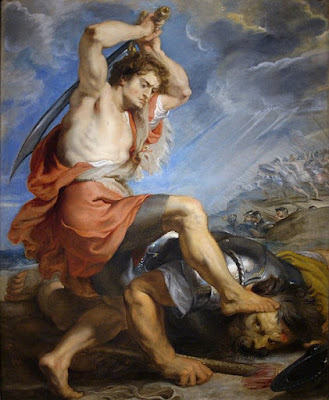The shepherd David agreed to fight him, but the sword and armor was too bulky, so he took his clothes off and fought with just a slingshot. He immobilized the giant, then rushed up with a sword and decapitated him.
Don't read too far, though, since in 2 Samuel we discover that David didn't do the job at all; it was Elhanan the Bethlehemite.
The story of David and Goliath in 1 Samuel was a mainstay of Sunday school classes, probably because it showed a little guy triumphing over a big guy. And because it's rather fun to imagine a nude, muscular shepherd boy striding across the battlefield, his penis swinging, the warriors all gazing in awe at his beauty.
The Biblical writers probably intended for David to be well into adulthood, in his late twenties, but artistic depictions generally make him 14-15. And leave his pants on, as in this painting by French artist Gabriel Ferrier (1847-1914)
Peter Paul Rubens (1577-1640) made him the right age, but upped the clothing, giving him a tunic and pants.
This Italian engraving by Marcantoni Raimondi (1480-1534) gives David a massive body and a penis, with a cloak flapping behind him.
More Davids after the break
Daniele de Volterra (1509-1566) emphasizes Goliath's buffed body.
Alessandro Turchi (1578-1649) shows us a beautiful angelic David holding the gross bloody head. Quite a contrast.

Antonio Zanchi (1631-1722) clothes both David and Goliath.
Most of the artistic depictions of David and Goliath come from the late Renaissance and Baroque eras. Going by the hair and face, you would expect this nude David in Zurich to be Baroque, too, but it's actually by Ivar Johnsson, erected in 1921.
Michelangelo's David (1501-1504) is the most famous statue in the world. No Goliath around, just the nude, amazingly beautiful David, his cloak in his hand, his bag of stones at his feet, frozen at a pivotal moment of his life.
There are replicas in many cities, including Antwerp, Buffalo, Mexico City, Philadelphia, and Montevideo.
And in the living rooms of about a million gay men of a certain age, who used it to communicate gay identity in the years before Stonewall.








My older cousin (who is bisexual) has a David. I remember being a teenager and not even thinking about it.
ReplyDeleteFunny thing, the word P'lishtim means invaders from across the sea. They were apparently pirates. Hadrian renamed Judea after them and the Assyrians to mark his victory over Bar Kochba, Syria Palæstina.
Times change. The Philistines are extinct, and the Assyrinas, another Biblical enemy of the Jews, sent a congratulatory letter to Bibi over the American embassy move. (An aside: Minorities in Arab countries tend to be more gay-friendly, as long as you aren't a cartoon character. I know Kurdistan wants to be the first communist country with equal rights for LGBT.)
A quick bit: In ancient times, men fought earlier.
ReplyDeleteI did coin the term "David complex" to describe a weird tendency in gay and lesbian studies, especially when it comes to make romances: Look for evidence of a lover of the same sex, ignore that a character or historical person definitely has an interest in the opposite sex because bisexuals don't exist. (You see, I was born in Atlantis. My parents are Santa Claus and the Tooth Fairy, and my godfather is Tyler Durden.)
David is a perfect example, since Uriah and Bathsheba are a thing. He clearly shows interest in Jonathan, and when you remove euphemism ("bowed thrice, until David exceeded"), their romance is actually quite explicit. But David also sent his best general to die just so he could sleep with the man's wife, not exactly the actions of a gay man. But there is the obvious solution.
A big issue with 90s/early 00s gay studies in general was this.
You did not post Caravaggio's take on the story-which has very sweet looking David thrusting Goliaths bloody head straight at us
ReplyDelete